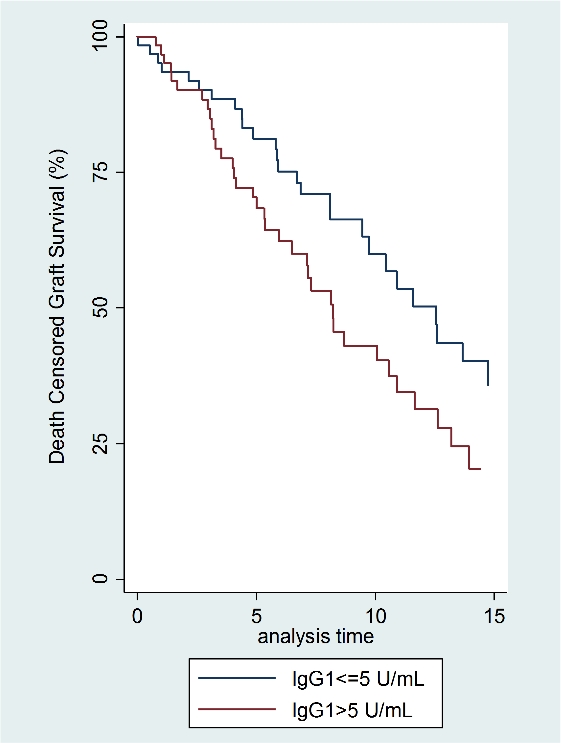Angiotensin Receptor Antibody IgG1 Subclass Predicts Accelerated Graft Loss in Those Kidney Transplant Recipients Who Develop Biopsy Proven Transplant Glomerulopathy Irrespective of the Presence Or Absence of Donor Specific Anti HLA Antibodies
1Central Northern Adelaide Renal and Transplantation Service, Royal Adelaide Hospital, Adelaide, SA, Australia
2Centre for Cardiovascular Research, Charite Hospital, Berlin, Germany.
Meeting: 2015 American Transplant Congress
Abstract number: A124
Keywords: Antibodies, Graft failure, Kidney transplantation, Rejection
Session Information
Session Name: Poster Session A: Kidney Antibody Mediated Rejection
Session Type: Poster Session
Date: Saturday, May 2, 2015
Session Time: 5:30pm-7:30pm
 Presentation Time: 5:30pm-7:30pm
Presentation Time: 5:30pm-7:30pm
Location: Exhibit Hall E
We assessed the presence or absence of angiotensin receptor antibodies (ATRab) in all those Kidney Transplant Patients who have had biopsy proven transplant glomerulopathy (TG) meeting Banff criteria at our institution between 1980-2011. All sera at the time of transplantation were assessed retrospectively.Out of 1729 transplant episodes there were 141 diagnoses of (TG)
ATRab are implicated as independent risk factors for early vascular rejection, cellular rejection and late graft loss; even in the absence of HLA antibodies. ATRab however exist, like all antibodies, in the IgG subclasses 1 through 4.
We assessed the relationship of these sub classes to total ATRab levels and also to graft outcome in multivariate analysis.
There was no correlation of total ATRab levels and IgG1 but there was a weak positive correlation with IgG2,3,4 subclasses. Although IgG2,3,4 subclasses did not correlate with graft outcome IgG1 subclass levels did. 
In multivariate analysis correcting for the effect of donor age, recipient age, HLA antibodies and graft number – the presence of ATRab IgG1 subclass above the median value (5 u/ml) was associated with accelerated graft loss (HR 1.91 [95%CI 1.01-3.6] p=0.045). Total ATRab did not predict graft loss over and above the variables listed. The only other variable to independently predict outcome was graft number (HR 2.14[95%CI 1.16-4.0] p=0.017)
These data suggest that optimisation of the ATRab assay may be possible by focussing on the complement fixing IgG1 Angiotensin Receptor Antibody subclass
To cite this abstract in AMA style:
Carroll R, Phillippe A, Dragun D, Coates T. Angiotensin Receptor Antibody IgG1 Subclass Predicts Accelerated Graft Loss in Those Kidney Transplant Recipients Who Develop Biopsy Proven Transplant Glomerulopathy Irrespective of the Presence Or Absence of Donor Specific Anti HLA Antibodies [abstract]. Am J Transplant. 2015; 15 (suppl 3). https://atcmeetingabstracts.com/abstract/angiotensin-receptor-antibody-igg1-subclass-predicts-accelerated-graft-loss-in-those-kidney-transplant-recipients-who-develop-biopsy-proven-transplant-glomerulopathy-irrespective-of-the-presence-or-ab/. Accessed July 12, 2025.« Back to 2015 American Transplant Congress
